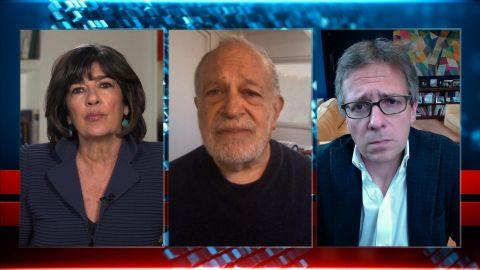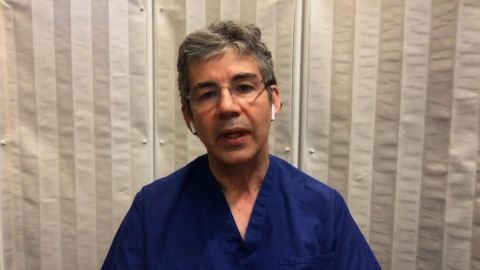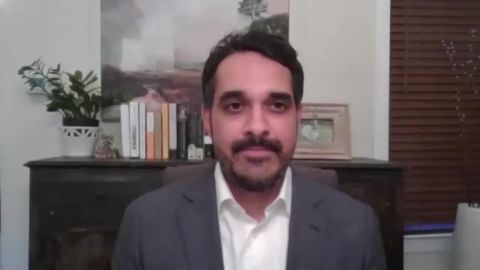Read Transcript EXPAND
CHRISTIANE AMANPOUR: And now, as the U.S. Treasury begins bailing out businesses across America, it is important to know which companies are getting that money and how it`s being spent. Bharat Ramamurti was the first person named to the congressional oversight commission tasked with policing coronavirus and the corporate relief loans. He joined contributor Sheelah Kolhatkar to discuss his new role.
(BEGIN VIDEOTAPE)
SHEELAH KOLHATKAR: Bharat Ramamurti, thank you so much for joining us.
BHARAT RAMAMURTI, CONGRESSIONAL OVERSIGHT COMMISSION MEMBER: Sure. Thanks for having me on.
KOLHATKAR: Thirty million Americans have filed for unemployment protection in the last six weeks. That`s 18 percent of the U.S. labor force. But, at the same time, in the month of April, the stock market went up 13 percent, its highest monthly performance since 1987. What does this say to you?
RAMAMURTI: Well, it says a lot about the kinds of safety nets that we have in the American government. So, the program that I and the other members of the Oversight Commission are responsible for overseeing is a program that operates through the Treasury Department and the Federal Reserve. And it uses about $500 billion of taxpayer money to support what could be up to $5 trillion in lending to big and medium-sized corporations through the Federal Reserve. And so the fact that Congress can operate through the Federal Reserve like that creates an incredible safety net for medium-sized and big corporations. And the result of that is that you have this trillions of dollars that is being funneled into the hands of corporate executives and corporate boards, and basically saying to them, you decide how best to use this money. And if you look back historically at the types of decisions that corporate executives and corporate boards have made over the last 10 or 20 years, they tend to favor corporate executives and corporate shareholders. And so I think it`s no surprise that, if the Fed is promising trillions of dollars in taxpayer-subsidized lending into the hands of corporate executives and corporate boards, that the reaction of the stock market is very positive.
KOLHATKAR: So, you could basically see a large company taking this taxpayer-backstopped loan from the Federal Reserve, laying off or furloughing workers, telling them to go file for unemployment, also subsidized by the taxpayer, and then using this loan money to pay very large executive salaries, to buy back its own stock. So, what is your role in terms of making sure that this does not happen?
RAMAMURTI: The commission that I`m part of is a five-member commission. And what makes it unique is that all five members are appointed by Congress. We are the only oversight body in the legislation that Congress recently passed to respond to the coronavirus crisis that is free from interference and tampering by the president and by the executive branch. And, as a result of that, I think we have the opportunity to perform very robust bipartisan oversight of how this money is being used. The other unique thing about this commission is that our statutory goal is to examine, how is this program affecting the financial well-being of American families? In other words, it`s not just to look for waste, fraud and abuse, just the kind of oversight you see from other oversight bodies. We have a very specific mission, which is to ask the broader question, how are the decisions that the Treasury and the Fed making actually affecting the well-being of American families, the 30 million workers that have been laid off, the families that are struggling with reduced hours or reduced pay, the families that are struggling to balance child care, while — and the lack of school, while trying to maintain employment? Those are the families that we`re supposed to be focused on. And that`s the kind of oversight that we`re supposed to be doing.
KOLHATKAR: Clearly, this kind of oversight is really important during a crisis like this. Yet we have had many indications from the president that he is not really interested in having his actions at this moment being closely monitored. He`s already fired one of the inspectors general. He`s appointed a White House lawyer to fill another crucial role. And he recently said, when he was asked about this: I will be the oversight. What went through your mind when you heard that comment?
RAMAMURTI: Well, I think that any time you`re talking about literally trillions of dollars in taxpayer money going out the door in relatively short order, it`s critically important to have a variety of different robust oversight mechanisms for that. And, as I said before, the key to our Oversight Commission is that it`s independent. It is free from tampering by the executive branch. And the concern is that, with this much money going out the door, is it being used to help the public interest, or is it being used for political reasons? Are politically connected companies or industries getting more generous support than other industries or other types of companies? That`s the kind of corruption that, I think, can undermine support, broad public support for these type of economic recovery programs. And that`s why I think that there should be broad bipartisan support, whether you`re a Democrat or Republican or independent. You should want robust oversight of this money, because we need to support a broad-based economic recovery from the coronavirus crisis. We are looking at 20 percent unemployment. The Congressional Budget Office is projecting that unemployment, as things stand, will be 10 percent even at the end of next year. And so it`s probably critically important that the money that we have already allocated be put to best use. And that`s the role of this Oversight Commission.
KOLHATKAR: Your commission doesn`t have subpoena power. What are the potential ramifications if a company misuses this taxpayer money?
RAMAMURTI: Well, I think step one is making sure that we know the identity of the companies that are getting the money. Believe it or not, as of a couple of weeks ago, the Federal Reserve had not committed to disclosing the names of the companies that were getting taxpayer-backed loans through the Fed or the terms on which they were getting that support. I pushed for robust disclosure of that information. And, thankfully, the Federal Reserve announced a few days ago that they would publish the names of the companies that are getting support every 30 days. So, that`s step one, is knowing the identity of these companies. Step two, as you said, is, what do these companies do after they get taxpayer-backed support? And that`s going to take a lot of staff work and a lot of oversight to monitor what could end up being thousands of companies who are getting taxpayer-backed support through the Federal Reserve. And the critical question is going to be, are these companies using the money to retain their work force or rehire workers, or are they going to use that money to provide executive compensation and shareholder bonuses, shareholder buybacks and dividends? That is going to be a critical factor in whether this money is used ultimately to benefit the financial well-being of American families, or whether, instead, it`s used to support a narrow slice of the wealthiest families.
KOLHATKAR: It sounds though, like public shaming is the main tool available to the commission in terms of encouraging appropriate behavior o behalf of these companies.
RAMAMURTI: Your — that is one tool, to be totally honest, and there are a few others. And the other thing is that we can work in cooperation with other oversight bodies that do have subpoena power. We can work with state attorneys general. We can work with federal law enforcement authorities if there is a case for a civil or criminal complaint because of the way that companies are using this money. Another critical oversight issue is that Congress said specifically in the bill that this money could not be used to support foreign companies. And it could not be used to support companies that are owned by members of Congress, members of the executive branch or their families. So there may be potential violations of those rules as well that we will have to carefully monitor.
KOLHATKAR: It sounds like you`re going to need an investigative team to do that, vast staff to go probing into how these companies are spending this money. What kind of staff do you have? What resources do you have available to do this?
RAMAMURTI: Well, at the moment, we have only got four out of the five members of the commission in place. We`re still missing the chair of the commission. Once the chair is named by Congress, I think we can get to work hiring staff. This was modeled after the 2008 OVERSIGHT COMMISSION that then Professor Elizabeth Warren chaired. That commission had dozens of staff members, as you said, digging into the details of what was going on at the Treasury Department at that time. I hope and assume that we will have a similar level of staffing for this commission. But we haven`t gotten to that point yet, because we`re still lacking a chair for the commission.
KOLHATKAR: The commission you`re serving on is bipartisan. You have been very vocal so far in requesting that some conditions be put on some of this Fed-administered money, such as restrictions on stock buybacks and executive compensation. But, already, one of your fellow members, Pat Toomey, the Republican senator, has said, well, this is not our job to impose these conditions. The Fed`s role is to comply with the statute. If Congress had wanted those restrictions in place, it would have been in the statute. What are your thoughts about this?
RAMAMURTI: Well, respectfully to my colleague, there is a lot of discretion in the law. And almost every day, the Treasury and the Fed are making decisions about how to use this money that go beyond the exact restrictions and direction that Congress gave them in the law. Just the other day, the Federal Reserve announced a series of changes to what it calls its Main Street lending facility. And those changes to the size of the loan, the maximum loan amount, to the types of companies that are eligible to get that money, to what companies can do with the money, all of those changes that the Federal Reserve announced weren`t specifically spelled out in the law. So, part of what the Oversight Commission is going to do is make sure that, where there are specific rules and the law, that those rules are being followed. But another part of what the Oversight Commission has to do is, where the Treasury and the Fed have broad discretion to decide what to do with the money, we have to ask the Treasury and the Fed, why are you making those decisions, and what is the ultimate impact of those decisions on the financial well-being of American families? That`s why I`m focused on this question about what companies end up doing with the money that we`re giving to them.
KOLHATKAR: You recently expressed some concerns about changes that had been made that seemed to benefit the oil and gas industry. Can you explain those a little bit?
RAMAMURTI: Sure. So, the purpose of this money is to help companies and workers who have been put in a tough position because of the coronavirus crisis and its effect on the economy. What it`s not supposed to do is bail out companies that were already in rough shape before coronavirus. And, in many cases, the oil and gas industry was in very rough shape, was already deeply indebted before the coronavirus crisis hit. And the concern I have is that certain changes that the Federal Reserve announced the other day, while seemingly technical, lined up almost exactly with the exact requests that the oil and gas industry had been making to the Federal Reserve. And, in that sense, we could end up seeing taxpayer-backed loans to oil and gas companies to help them out of a crisis that predated the coronavirus crisis. And, again, the question that that raises is, is that a good use of the taxpayer money? And is that consistent with the intention of this money as Congress laid out in the law?
KOLHATKAR: But we don`t want those companies to collapse. I mean, they do employ a lot of people. And, certainly, their argument would be, well, we want to survive this crisis so we can retain our work force.
RAMAMURTI: Yet, again, the key problem there is, even if you think that the role of this money is to help corporations, regardless of whether they were in good shape or bad shape before the coronavirus crisis — and I agree, obviously, all of these companies employ workers and it`s important that we provide aid to workers — the issue is that, despite all of the changes that the Federal Reserve announced the other day to make this money more accessible to the oil and gas industry, one change that they didn`t make is to add any requirement the companies that receive this money returned workers on payroll or even make an effort to rehire workers that they may have already laid off. And so I have deep sympathy for the people who work in that industry. If we`re going to provide money to those companies, I agree it should go to help the workers. My concern is that we seem to be helping the corporations and their creditors, which, in many cases, are banks, rather than the people who are actually employed by those companies.
KOLHATKAR: I remember, when the CARES Act passed, Democrats in particular made a big deal about how they were going to impose restrictions on how companies spend the money and that they weren`t going to let corporations use stimulus money to buy back their own shares or pay enormous executive bonuses. However, as time has gone on, we have learned that some of the fine print does actually leave a lot of wiggle room. Were they misrepresenting the situation when this legislation passed back in March?
RAMAMURTI: I think the issue is that, when you`re responding to a crisis, it makes sense to give the agencies that are responsible for administering the money some flexibility in determining how to use it. The question, though, is, why are the — those agencies subsequently making the decisions that they`re making? And are those decisions intended to support the broader public interest, or are they intended to support particular industries or particularly wealthy individuals? So I think that the issue here is not what Congress did. The issue is, what are the Fed and the Treasury doing with the authority that Congress rightfully gave to them? And the Treasury and the Fed have broad authority to make changes to how these programs operate. And my hope is that they are responsive to the concerns that the Oversight Commission and other advocates and experts are making. And let me just give you an example. The Federal Reserve announced that it was going to provide lending to state and local governments. And, initially, they said that that program would only be available to very, very large cities and counties. And the result was that the 35 cities in America with the highest proportion of black residents were not eligible for that Fed lending program. I raised some concerns about it. Several other people raised concerns about it, and the Federal Reserve went back and they revised those terms, so that much smaller cities would now be eligible, including cities like Atlanta and Detroit and Baltimore, that weren`t previously eligible for that lending. So it shows that the Federal Reserve is willing to be responsive to some of the criticisms and some of the attempts to improve the operation of its facilities. My hope is that they will also be responsive when it comes to some of the concerns that have been raised about how the money for big business is being handed out.
KOLHATKAR: Bharat Ramamurti, thanks so much for joining us.
RAMAMURTI: Thank you.
About This Episode EXPAND
Ian Bremmer and Robert Reich join Christiane Amanpour to analyze tensions between the U.S. and China. War doctor David Nott discusses the traumatic toll that the COVID-19 pandemic will take on the mental health of healthcare workers. Bharat Ramamurti joins Sheelah Kolhatkar to discuss business bailouts and explain the role of the Congressional Oversight Commission.
LEARN MORE


